Pulse 3.36 – Grid Icons Images
Pulse 3.36 Adds support for icons and images within tables:
Demonstrated in the video and multi-column sorting and real-time filtering.
Pulse 3.36 Adds support for icons and images within tables:
Demonstrated in the video and multi-column sorting and real-time filtering.
With QStudio and Pulse, we get to work hands-on with 30+ databases. That gives us a lot of appreciation for teams that do more with less – especially some of the smaller teams building compact databases and drivers that deliver an outsized amount of value.
In both Pulse and QStudio, we bundle a core set of JDBC drivers and optionally download others when a user adds a specific database. We do this deliberately to keep the applications lightweight. We care about every megabyte and don’t want to bloat either our product or our users’ SSDs.
Notice:
Obviously, a smaller driver or database isn’t always “better” in isolation. But having worked closely with these three in production settings, we can say they are exceptional pieces of engineering. The performance these teams achieve with such compact codebases is a testament to strong engineering discipline and a relentless focus on efficiency end-to-end. Huge congratulations to the teams behind them.
Scale matters but Efficiency is what makes scale sustainable.
42776 flight-sql-jdbc-driver-18.1.0.jar
27644 snowflake-jdbc-3.13.6.jar
19144 athena-jdbc-3.2.0-with-dependencies.jar
16696 kyuubi-hive-jdbc-shaded-1.7.1.jar
13904 ignite-core-2.15.0.jar
12728 sqlite-jdbc-3.42.0.0.jar
10284 kylin-jdbc-5.0.0-alpha.jar
10180 neo4j-jdbc-driver-4.0.9.jar
9856 trino-jdbc-422.jar
9652 presto-jdbc-0.282.jar
8984 redshift-jdbc42-2.1.0.28.jar
6564 jt400-20.0.0.jar
6504 presto-jdbc-350.jar
6268 mongodb-jdbc-2.0.2-all.jar
5652 taos-jdbcdriver-3.2.4-dist.jar
4964 gemfirexd-client-2.0-BETA.jar
4400 ojdbc8-19.19.0.0.jar
4060 jdbc-1.30.22.3-jar-with-dependencies.jar
3856 omnisci-jdbc-5.10.0.jar
3600 derby-10.15.2.0.jar
2556 h2-2.2.224.jar
2540 mysql-connector-j-9.1.0.jar
1628 hsqldb-2.7.2-jdk8.jar
1608 hsqldb-2.7.2.jar
1488 jdbc-3.00.0.1-jar-with-dependencies.jar
1456 redis-jdbc-driver-1.4.jar
1380 clickhouse-jdbc-0.6.0.jar
1368 jdbc-1.30.22.5-jar-with-dependencies.jar
1324 ngdbc-2.17.12.jar
1324 ngdbc-2.17.10.jar
1308 mssql-jdbc-10.2.1.jre8.jar
1268 avatica-core-1.17.0.jar
1240 clickhouse-jdbc-0.4.6.jar
1204 terajdbc-20.00.00.11.jar
1136 sqream-jdbc-4.5.9.jar
1084 solr-solrj-9.2.1.jar
1080 solr-solrj-9.3.0.jar
1064 postgresql-42.7.4.jar
1060 jdbc-4.50.4.1.jar
952 snappydata-store-client-1.6.7.jar
792 x-pack-sql-jdbc-7.9.1.jar
752 crate-jdbc-2.7.0.jar
516 nuodb-jdbc-24.1.0.jar
380 ucanaccess-5.0.1.jar
300 clickhouse-jdbc-0.2.6.jar
284 taos-jdbcdriver-3.2.1.jar
248 csvjdbc-1.0.40.jar
228 ignite-core-3.0.0-beta1.jar
124 lz4-pure-java-1.8.0.jar
100 hive-jdbc-1.2.1.spark2.jar
QStudio remains a fast, modern SQL editor supporting over 30 databases including MySQL, PostgreSQL, DuckDB, QuestDB, and kdb+/q. Version 5.0 continues our focus on performance, analytics and extensibility now with an open community behind it.
After 13 years of development, QStudio is now fully open source under a permissive license. Developers, data analysts and companies can now contribute features, inspect the code, and build extensions.
No enterprise edition. No restrictions. No locked features. QStudio is fully open for personal, professional, and commercial use.
 SmartDisplay is QStudio’s column-based automatic formatting system. By adding simple _SD_* suffixes to column names, you can enable automatic number, percentage, and currency formatting,Sparklines, microcharts and much more. This mirrors the behaviour of the Pulse Web App, but implemented natively for QStudio’s result panel.
SmartDisplay is QStudio’s column-based automatic formatting system. By adding simple _SD_* suffixes to column names, you can enable automatic number, percentage, and currency formatting,Sparklines, microcharts and much more. This mirrors the behaviour of the Pulse Web App, but implemented natively for QStudio’s result panel.

Fine-tune axes, legends, palettes, gridlines and interactivity directly inside the chart builder.
Better auto-complete, themes and tooling for large SQL files.
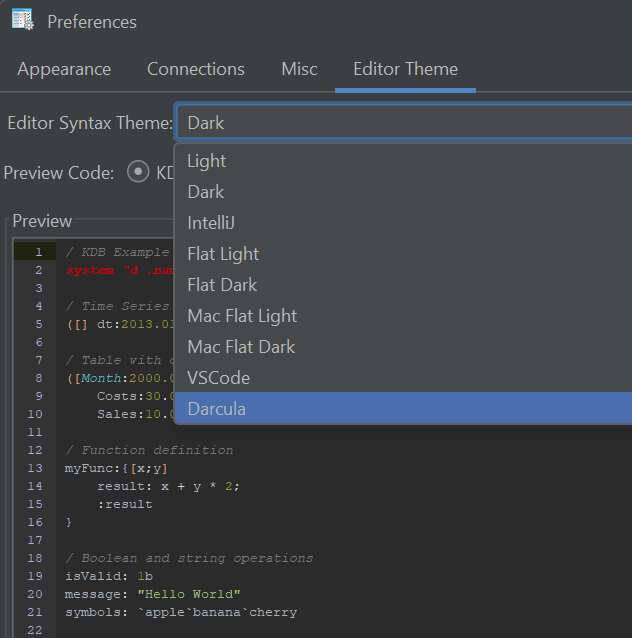
Pin results within the history pane for later review or comparison.

Control+Shift+F to search all open files and your currently selected folder.
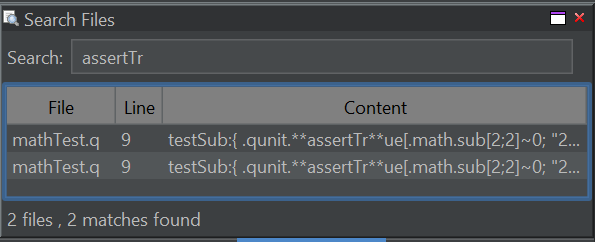
We aim to create the best open SQL editor for analysts and engineers. If you spot a bug or want a feature added, please open an issue
Pulse 3.28 is now released. (Release notes)
You can now add table footers that show aggregated views of the data including average, count and sum.
The aggregation function for a given column can be chosen within the column specific configuration:
Allow users to get an overview of the data in one column. How many unique values does it contain, nulls, minimum, maximum etc.
Other additions include:
QStudio 4.15 Released today with new “Find All” – Press Control+Shift+F to activate.
Download Now.
Thanks to JPArmstrong for the idea.
Added highlighting support for python, closure, jflex, rfl, javascript, scala, xpath.
Pulse 3.25 released with Conditional formatting, a new form creator and new date picker widgets:
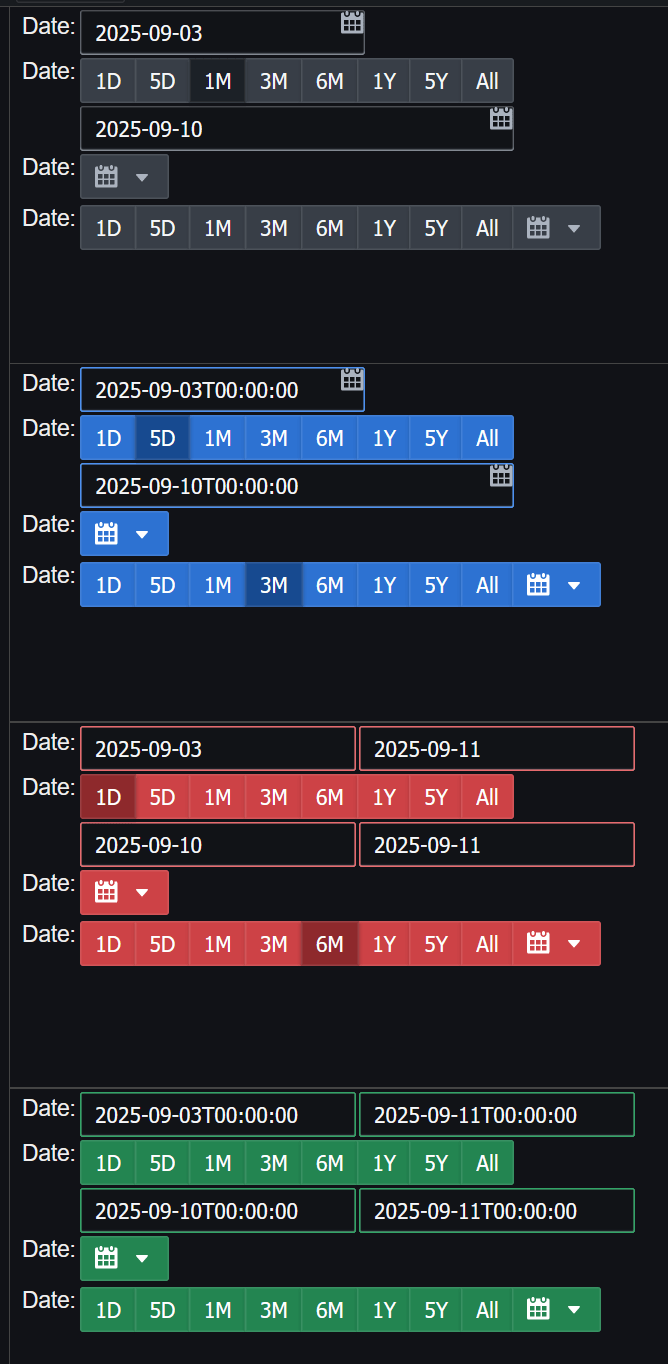
__ALL__ for when there are lots of options.Update 2025-09-13 – Number being reported is closer to 200.
Update 2025-09-15 – KX and onemarketdata (onetick) have merged.
https://kx.com/news-room/kx-and-onetick-merge-to-unite-capital-markets-data-analytics-ai-and-surveillance-on-one-platform/
QStudio 4.09 introduces a number of new features to make exploring data easier than ever.
Allows getting a count of nulls, averages and how many distinct values a column contains by hovering the column header:

Have a very wide table? Want to quickly see all the column?
Transpose from a row to column based layout for those rows. Allowing you to quickly see all values:
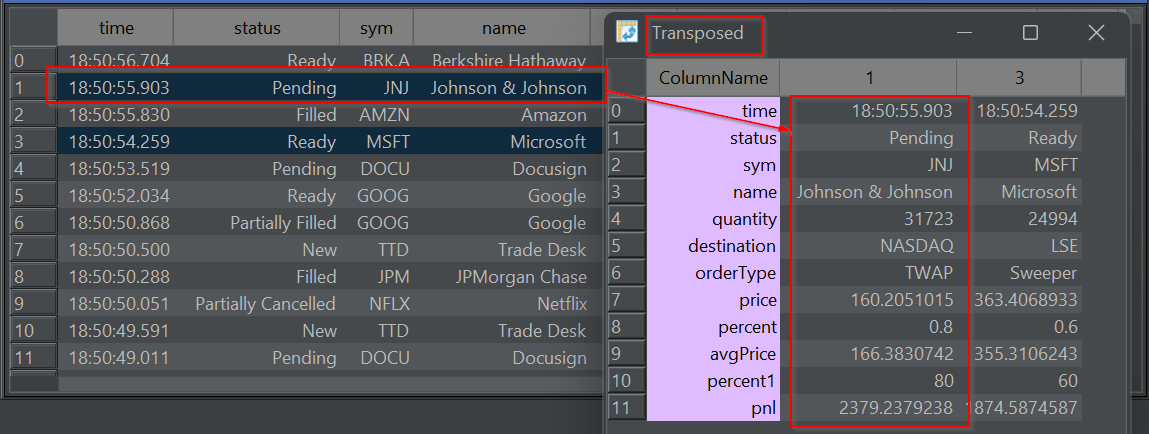
Double-click on a nested array or kdb structure (table/dict) to pop-out a table showing only the nested item. You can repeat this to dig deeper and deeper into nested data. (Thanks to Oleg/QPad on pioneering this idea).
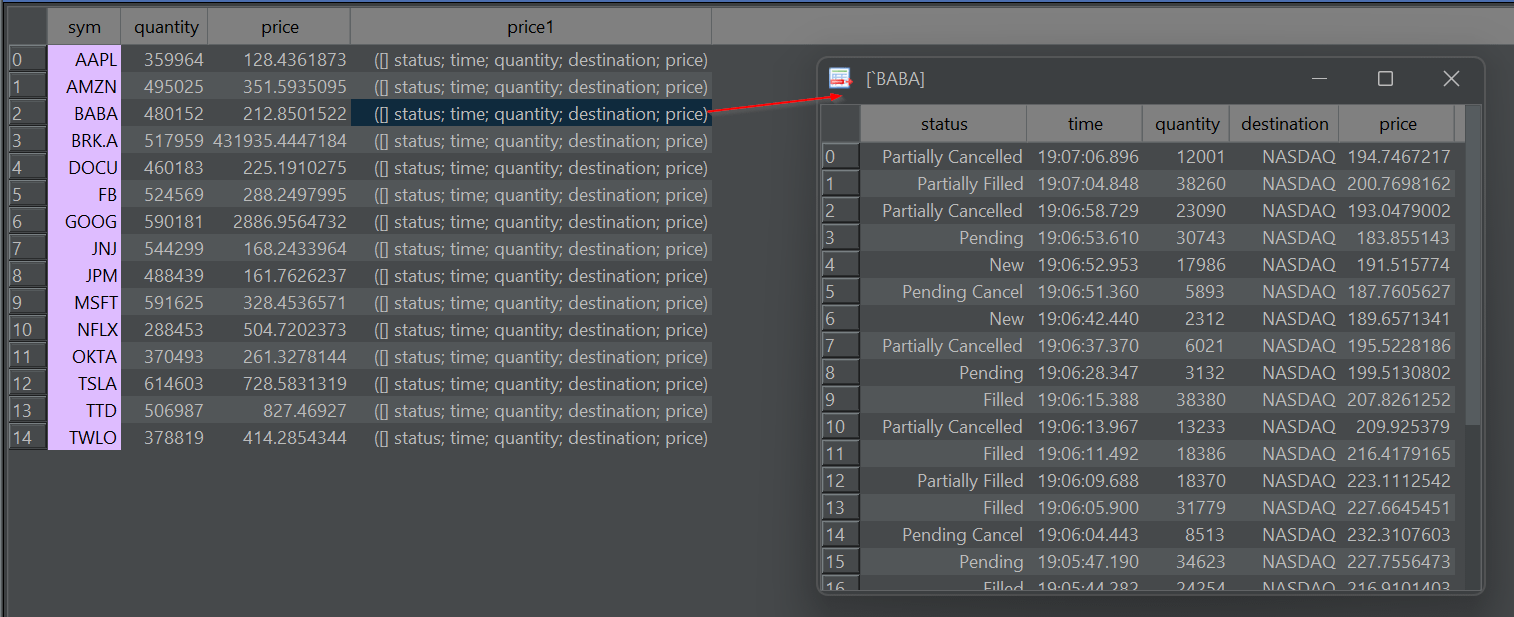
As well as these new features, a large number of bugs were fixed:
All past release changes can be found here.
2025-05-12 – 4.09 – Improve Autocomplete suggestions
– Add namespace listing panel.
– Improve QDoc to add file level details.
2025-04-22 – 4.08 – Bugfix: Candlestick charts were wrong as receiving wrong timezone from kdb driver. Timezone now set to UTC.
– Bugfix: “Save as” to .sql was shrinking text. Now fixed.
– Bugfix: Show red X close on every document tab.
2025-04-06 – 4.07 – Add UI Scaling and Font size as separate options to help with 4K monitors
– Bugfix: Kdb+ Queries with errors could cause 30 second freezes.
– Bugfix: Switch back to MonoSpaced font. Variable width fonts cause wrong caret position.
– Improved high resolution QStudio icon.
– Mac: Bugfix: Prefences dialog fixed and allows choosing font.
– Mac: Fixed Menu shoing about/preferences/exit.
– Mac: Allow Command+Option+E to run current query.
– 4K handling improved sizing of dialogs.
– Bugfix: Improved duckdb init when folder is empty.
2025-03-13 – 4.06 – Add ability to transpose rows.
– DuckDB 1.2.1. Improve display of DuckDB arrays.
– Add comma separator for thousands option.
2025-02-23 – 4.05 – Upgrade kdb+ c/jdbc.java to allow SSL TLS.
– Add preference to allow hiding all tooltips.
– Double-click on kdb+ table with dictionary/table/list nested in cell will pop it out.
2025-01-23 – 4.04 – Show column info (avg/min/max) when column header is hovered.
– Remove watched expressions entirely.
– Improved UI threading for tree/chart display.
2025-05-08 – Private equity firm TA announced an “All-Cash Offer to Acquire FD Technologies, Owner of Global Real-Time Analytics Leader KX”.
Most people are probably wondering how this came about:
Releasing dashboards from file to allow git file based deploys:
Improved Form Customization with radio/checkbox inline/disabled/large options. Allow specifying step size and labels for numeric slider.
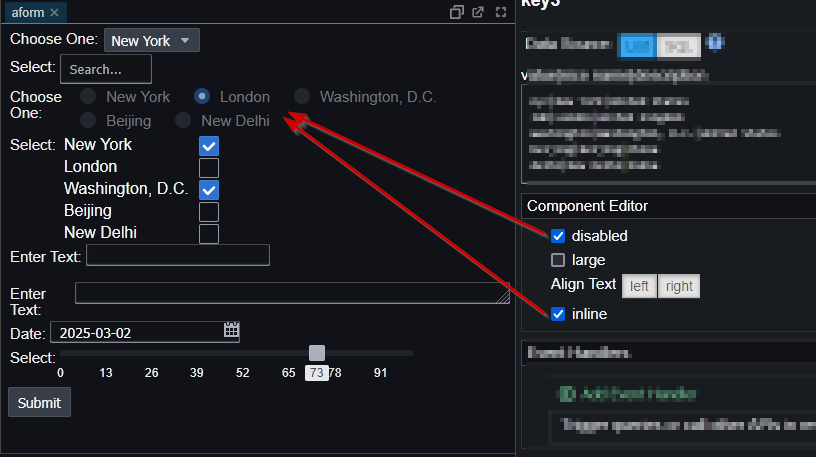
Send {{ALL}} variables to kdb+ as a nested dictionary: